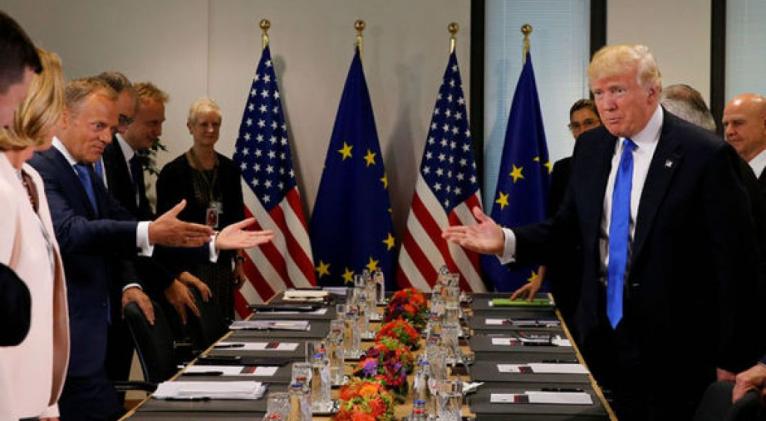Trump, European Union leaders remain at odds over Russia
especiales

BRUSSELS – As President Trump met with European leaders on Thursday, he couldn't escape the Russia controversy dogging him at home and now abroad.
The White House is grappling with multiple investigations into Russia's interference in last year's presidential election, including an FBI probe into possible collusion between Trump's campaign and Moscow. Still, Trump has openly sought warmer relations with Russia – and just this month welcomed top diplomats to a controversial Oval Office meeting in which he reportedly disclosed highly classified information in an apparent attempt to get Moscow to step up its fight against the Islamic State.
Yet in Brussels, home of the NATO and European Union headquarters, EU leaders publicly broke with Trump's more positive diplomatic approach to President Vladimir Putin's government.
"I am not 100% sure that we can say today ... that we have a common position, common opinion, about Russia," said European Council President Donald Tusk after meeting with Trump. Tusk added that both parties remain critical of Russia's military incursions into neighboring Ukraine.
Tusk also said "some issues remain open" with Trump, including climate change and trade policy.
Trump's meeting with Tusk, who presides over the European Council, and Jean-Claude Juncker, president of the European Commission, preceded talks with leaders of the North Atlantic Treaty Organization.
The Brussels stop came in the middle of Trump's first foreign trip as president, one that began with visits to Saudi Arabia, Israel, and Rome. Trump is spending nine days away from Washington, which is still reeling from a spate of recent revelations related to Trump's links to Russia.
Trump's first foreign trip as president came a week after the Justice Department appointed a special counsel to look into possible ties between Trump campaign associates and Russians who sought to influence the 2016 presidential campaign. The U.S. intelligence community has accused Moscow of orchestrating a high-level campaign of cyberattacks, propaganda and fake news to try and influence the 2016 election, though the president and his aides have denied any collusion.
Still, EU members have long questioned Trump's warm comments toward Putin, who has backed many anti-EU candidates in elections throughout the continent. And countries such as France, Germany, and the United Kingdom have expressed concerns about similar Russian hacking and disinformation campaigns to undermine elections in their countries.
Trump's lean towards Russia was on full display one day after firing his FBI director, when Trump took an Oval Office meeting with Russian Foreign Minister Sergey Lavrov and Sergey Kisylak, the Russian ambassador to the U.S. on May 10. The Washington Post subsequently revealed Trump divulged highly classified intelligence in that meeting about a terror plot, in a way the Russians could have deduced secret sources and methods.
This is notable not just because it potentially compromised a source of intelligence on the Islamic State – believed to be Israel – but because Russia has also backed Syrian president Bashar al-Assad, whom the U.S. and European countries accuse of widespread killing civilians and opponents in the name of fighting terrorism.
Trump also unnerved European Union leaders by supporting last year's "Brexit" vote in which the United Kingdom opted to exit the EU. Trump, who met with new president of France, Emmanuel Macron also had kind words for defeated French presidential candidate Marine Le Pen, another EU opponent.
While Trump said better American relations with Russia would benefit all nations, he has also opposed Putin on occasion. The Trump administration supported Montenegro's admission to NATO, an addition Russia opposed. The president has made no move to lift sanctions on Russia over its activities in Ukraine.
Trump ends his journey this weekend at a Group of Seven industrial nations summit on the Italian island of Sicily. Trump is expected to air his concerns about what he calls unfair trade policies by other nations and the Paris climate change pact that obligates the United States to reduce greenhouse gas emissions – two other issues on which the president and European Union leaders disagree.
The Trump-EU meeting did have its lighter moments, including the fact that complex European Union rules require the naming of two presidents: Tusk, who presides over the European Council, and Juncker, president of the European Commission.
“Do you know, Mr President, we have two presidents in the EU,” Tusk told Trump, who responded: “I know that."
Juncker chimed in by joking, "there is one too much."
Later, when asked his impressions of Trump, Juncker simply said, "I hope he hasn't sent a tweet about me yet."













Add new comment